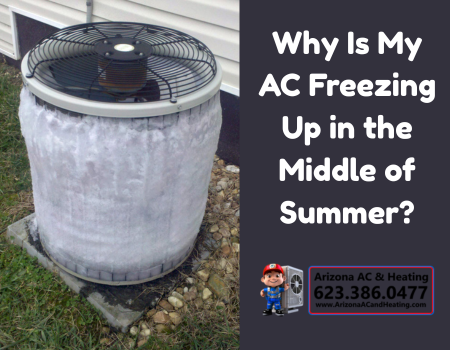Nothing’s worse than battling the summer heat, only to find your air conditioner covered in ice — freezing in the middle of an Arizona heatwave. It might seem odd for something meant to cool your home to freeze over when it’s scorching outside, but it’s a surprisingly common issue. If you’ve noticed ice on your AC unit’s evaporator coil or refrigerant lines, you’re likely wondering what went wrong. Let’s explore the most common reasons your AC might freeze up in summer and what you can do about it.
 How Does an AC Freeze in Hot Weather?
How Does an AC Freeze in Hot Weather?
Your air conditioner works by drawing warm air from your home over evaporator coils filled with cold refrigerant. This refrigerant absorbs the heat, cools the air, and cycles it back into your home while moving the heat outdoors. When this process is disrupted — typically due to airflow issues, low refrigerant, or dirty components — the temperature of the refrigerant can drop too low, causing condensation on the coils to freeze.
In hot weather, your system runs harder and longer, which can worsen small problems and lead to freezing.
Common Reasons Your AC Freezes Up
- Restricted Airflow
Proper airflow is essential to keep the evaporator coil from getting too cold. If not enough warm air passes over the coils, the refrigerant inside them won’t absorb enough heat — leading to freezing. Common airflow blockages include: - Dirty air filters: A clogged filter is one of the top culprits for AC freezes.
- Blocked or closed vents: Make sure supply and return vents are open and unobstructed.
- Dirty evaporator coils: Dust and debris on the coils prevent efficient heat exchange.
- Collapsed or obstructed ductwork: Crushed or blocked ducts reduce airflow significantly.
- Low Refrigerant Levels
If your system is low on refrigerant — usually due to a leak — the pressure in the evaporator coil drops, causing the refrigerant’s temperature to fall below freezing. Humidity in the air settles on the cold coils and turns into ice. A professional HVAC technicianwill need to locate and fix the leak, then recharge the system. - Thermostat Problems
A malfunctioning or improperly set thermostat can cause the system to run continuously without proper cycling. This non-stop operation allows the coils to become too cold, especially during cooler nighttime temperatures, eventually leading to ice buildup. - Mechanical Issues
Failing components like a broken blower fan can reduce airflow over the coils. If the fan motor, belts, or blades aren’t working correctly, warm air won’t circulate as needed, allowing the evaporator coil to drop to freezing temperatures. - High Humidity
Seattle summers can be humid, and excessive moisture in the air increases condensation around the evaporator coil. If your AC can’t manage the moisture, it can lead to ice forming on the coils — especially if combined with any airflow or refrigerant issues.
How to Tell If Your AC Is Freezing Up
Look out for these signs:
- Ice or frost on the refrigerant lines or evaporator coil
- Warm air blowing from your vents
- Water pooling near your indoor unit (as the ice melts)
- Unusual hissing sounds from refrigerant leaks
- Frequent system shutdowns or unusually long cooling cycles
If you notice any of these, it’s best to shut off your AC and let it thaw completely before running it again.
What to Do If Your AC Freezes
Step 1: Turn off the system at the thermostat and the breaker to prevent further damage.
Step 2: Check and replace your air filter if it’s dirty.
Step 3: Open all vents and inspect for any visible obstructions.
Step 4: Allow the unit to thaw, which might take a few hours.
Step 5: Once thawed, restart the system and monitor it closely.
If the problem persists, or if you suspect a refrigerant leak, contact a professional HVAC technician for a proper diagnosis and repair.
How to Prevent Future AC Freezes
- Change air filters regularly (every 1–3 months)
- Schedule routine AC maintenance at least once a year
- Keep vents open and unobstructed
- Have your refrigerant levels checked during seasonal tune-ups
- Include cleaning the evaporator and condenser coils in your routine maintenance.
Preventative care is the most reliable way to keep your system running smoothly during summer’s peak heat and avoid freezing.
An air conditioner freezing up in the middle of summer isn’t just an inconvenience — it’s a warning sign. Whether it’s a simple clogged filter or a more serious refrigerant issue, addressing the problem promptly can prevent higher repair costs and extend your AC’s lifespan. Regular maintenance and a little attention to your system’s performance go a long way toward keeping your home cool and comfortable, even on the hottest days.
